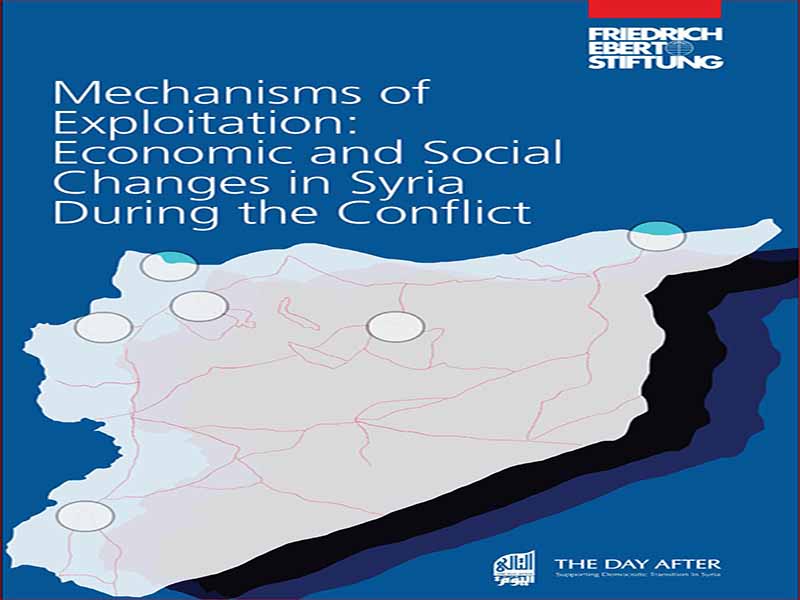- عنوان کتاب: Mechanisms of Exploitation: Economic and Social Changes in Syria During the Conflict
- نویسنده: Bashar Mozayek
- حوزه: استعمار
- سال انتشار: 2022
- تعداد صفحه: 106
- زبان اصلی: انگلیسی
- نوع فایل: pdf
- حجم فایل: 3.19 مگابایت
در مارس 2011، مردم سوریه در اعتراض به وضعیت محرومیت سیاسی، اقتصادی و اجتماعی که توسط رژیم سوریه اعمال می شود، اعتراض کردند. این خواسته با خشونت شدید رژیم مواجه شد. این امر پایههای خشونتهای مسلحانه، مداخلات خارجی و ورود به تونل جنگ قدرت را که بیش از یک دهه است ادامه دارد و طی آن نیروهای مختلف بالفعل کنترل مناطق مختلف سوریه را به دست گرفتند، ایجاد کرد. این نیروها مکانیسمهای استثماری را ایجاد کردهاند که از طریق آن فرآیند تبدیل منابع اقتصادی را که قبلاً در نتیجه تضاد به خطر افتاده بود، به کار میگیرند و از ساختارهای اجتماعی سنتی برای خدمت به اهداف خود و دستیابی به پایداری اقتدار خود به بهای منافع خود استفاده میکنند. اکثریت مردم سوریه غلبه بر اثرات فاجعه بار این درگیری مستلزم درک وضعیت کنونی مردم سوریه در مناطق مختلف از طریق رصد و تحلیل تغییرات اقتصادی و اجتماعی، علاوه بر تجزیه و تحلیل مکانیسمهای استثمار اقتصادی و اجتماعی توسط نیروهای مختلف بالفعل است. این تحقیق سعی دارد بر اساس درک این تغییرات و سازوکارها به سیاستها و پیشنهادهای عملی دست یابد که به سوریها کمک میکند تا با شرایط فعلی سازگار نشوند، بلکه آن را در راستای آرزوهای خود برای دستیابی به توسعه فراگیر در مناطق مختلف سوریه تغییر دهند. این تحقیق به دو بخش اصلی تقسیم میشود، بخش اول به تحلیل وضعیت اقتصادی و اجتماعی در سطح کلان در مناطق مختلف سوریه و بخش دوم به تحلیل وضعیت زندگی در سطح خانواده سوری با بررسی نمونهای معرف از شش شهر مختلف میپردازد. مقامات عملی تجزیه و تحلیل کلان شامل مطالعه واقعیت بخشهای اقتصادی، مالی و پولی سوریه قبل از سال 2011، چگونگی تأثیر درگیری بر آنها و درک پویاییهای جمعیتی، آموزشی و بهداشتی قبل و حین درگیری است. نتایج تحقیق حاکی از کاهش شدید تولیدات کشاورزی، صنعتی و خدماتی در نتیجه تخریب زیرساخت های اقتصادی و اقدامات غارتگرانه توسط تمامی گروه های مسلح بود. دلایل دیگر شامل جنگ سالاران و مقامات عملی کنترل پویایی اقتصادی در مناطق مختلف با فقدان کامل حاکمیت قانون و گسترش خویشاوندی و فساد بود. همچنین اتکای تقریباً کامل به بازارهای خارجی برای تأمین نهاده های تولید اقتصادی و کالاهای اساسی نقش بسزایی داشت که منجر به از بین رفتن حاکمیت اقتصادی کشور شد. این گزارش بر کاهش منابع مالی نیروهای بالفعل و وابستگی مالی آنها به منابع غیر محرک تولید مانند فعالیتهای غیرقانونی، کاهش یارانههای واقعی کالاها و خدمات، افزایش هزینهها و مالیاتها، اخاذی مالی از بازرگانان و وابستگی به نقل و انتقالات خارجی از سوی مهاجران و حمایت متحدان. این امر با سقوط نرخ مبادله پوند سوریه و کاهش قدرت خرید سوری ها و کمبود کالاها و خدمات اساسی همراه بود. علاوه بر این، بازار کار متاثر از انحرافات بسیاری از جمله مهاجرت کادرهای واجد شرایط، استثمار کارگران توسط کارفرمایان به ویژه زنان و تقریباً فقدان فرصتهای شغلی مناسب در بخشهای تولیدی، علاوه بر احیای جنایات و جنایتکاران بوده است. فعالیت های مرتبط با تعارض سوری ها همچنان در میان آوارگان و پناهندگان پراکنده هستند. اکثر آنها از شرایط سخت اقتصادی و معیشتی رنج می برند، علاوه بر این که نیروهای داخلی و خارجی از موقعیت خود برای دستیابی به دستاوردهای سیاسی و اقتصادی استفاده می کنند و گاه آنها را وادار به ایجاد تغییرات جمعیتی در برخی مناطق داخل سوریه می کند تا منافع این افراد تامین شود. نیروها علیرغم ثبات نسبی امنیتی و نظامی از سال 2019، بخشهای بهداشت و آموزش همچنان از نظر کمی و کیفی در وضعیت بدی قرار دارند و نیروهای مختلف این بخشها را سیاسی کرده و از آنها برای افزایش وفاداری به مقامات استفاده میکنند. نتایج همچنین حاکی از توسعه روابط بین نیروهای بالفعل در سوریه و نهادهای فرقهای، قبیلهای و منطقهای است که باعث تقویت جایگاه این نهادها شده و منجر به وخامت بیشتر سرمایه اجتماعی در سطح ملی و کاهش سرمایه اجتماعی شده است. نقش ضعیف زنان در مشارکت در تصمیم گیری عمومی.
In March 2011, Syrians came out to protest the state of political, economic and social exclusion practiced by the Syrian regime. This demand was met with extreme violence by the regime. This laid the foundations for armed violence, external interventions, and entering the tunnel of the power struggle that has been going on for more than a decade, during which various de facto forces took control of different regions in Syria. These forces have developed exploitation mechanisms through which they exercise the process of transforming economic resources, which were already compromised as a result of the conflict and harnessing traditional social structures to serve their goals and achieve the sustainability of their authority at the expense of the interests of the majority of Syrians. Overcoming the catastrophic effects of this conflict requires understanding the current situation of Syrians in various regions through monitoring and analyzing economic and social changes, in addition to analyzing the mechanisms of economic and social exploitation practiced by the various de facto forces. This research attempts to build on the understanding of these changes and mechanisms to reach policy and practical proposals that help Syrians not adapt to the current situation but rather change it in line with their aspirations to achieve inclusive development in various Syrian regions.
The research is divided into two main sections, the first analyzing the economic and social situation at the macro level in the various Syrian regions and the second analyzing the living situation at the level of the Syrian family by surveying a representative sample of six cities under different de facto authorities. The macro analysis includes studying the reality of Syria’s economic, financial and monetary sectors before 2011, how the conflict affected them, and an understanding of the demographic, educational and health dynamics before and during the conflict. The results of the research indicated a sharp decline in agricultural, industrial and service output as a result of the destruction of the economic infrastructure and acts of looting by all armed groups. Other reasons included warlords and de facto authorities controlling the economic dynamics in various regions with the complete absence of the sovereignty of law and the spread of nepotism and corruption. Also, relying almost entirely on foreign markets to secure the inputs of economic production and basic commodities played a significant role, which led to the loss of the country’s economic sovereignty.
The report highlighted the depletion of the financial resources of the de facto forces and their financial dependence on non-stimulating sources of production such as illegal activities, reduction of actual subsidies on goods and services, increased fees and taxes, financial extortion of merchants, and the dependence on external transfers from expatriates and support of allies. This was accompanied by the collapse of the Syrian pound exchange rate and the Syrians’ shrinking purchasing power, in addition to the lack of basic goods and services. Furthermore, the labor market has been affected by many distortions, including the emigration of qualified cadres, the exploitation of workers by employers, especially women, and the almost lack of decent job opportunities in the productive sectors, in addition to the revival of criminal and conflict-related activities.
The Syrians continue to be dispersed among displaced and refugees. Most of them suffer from difficult economic and living conditions, in addition to the exploitation of their situation by internal and external forces to achieve political and economic gains, sometimes pushing them to bring about demographic changes in some areas inside Syria to serve the interests of these forces. Despite the relative security and military stability since 2019, the health and education sectors are still in a state of deterioration in terms of quantity and quality, with the various forces politicizing these sectors and using them to enhance loyalty to the authority. The results also indicated the development of the relationship between the de facto forces in Syria and the sectarian, tribal and regional institutions, which strengthened the status of these institutions and led to a further deterioration in social capital at the national level and a decline in the already weak role of women in contributing to public decision-making.
این کتاب را میتوانید از لینک زیر بصورت رایگان دانلود کنید:
Download: Mechanisms of Exploitation




































نظرات کاربران